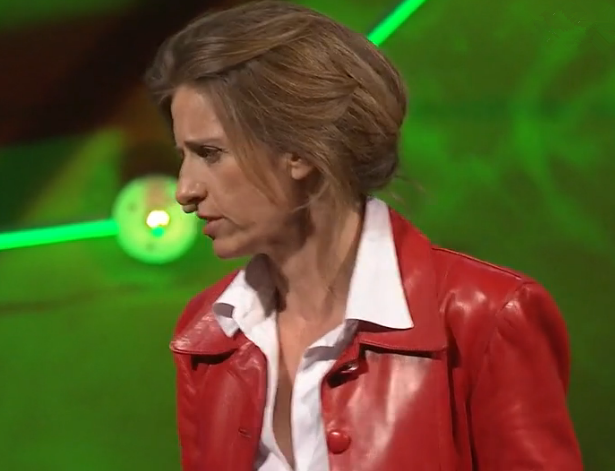(单词翻译:单击)
演讲文本
Now around Chernobyl, there are scattered ghost villages,
如今切尔诺贝利附近到处是毫无人烟的村庄,
eerily silent, strangely charming, bucolic, totally contaminated.
静得吓人,诡谲迷人的气息,一片荒芜,完全受到污染。
Many were bulldozed under at the time of the accident,
在那次的意外中有许多房屋被铲平,
but a few are left like this, kind of silent vestiges to the tragedy.
但是有一些遗留下来,就像这样,有点像是灾难过后的死寂遗迹。
Others have a few residents in them, one or two "babushkas," or "babas,"
有一些居民住在这样的房屋里,一到两位“巴布希卡”或“巴巴”
which are the Russian and Ukrainian words for grandmother.
在俄语和乌克兰语中指的是祖母。
Another village might have six or seven residents.
另一个村庄也许有六到七个居民,
So this is the strange demographic of the zone -- isolated alone together.
因此成了这个地区中特异的人口分布:孤零零的独居与聚集。
And when I made my way to that piping chimney I'd seen in the distance,
当我往前走向在远处看见那个冒着烟的烟囱,
I saw Hanna Zavorotnya, and I met her.
我看到汉娜·沃洛纽克,向前和她接触。
She's the self-declared mayor of Kapavati village, population eight.
她是卡拉瓦帝村庄的自立村长,管辖八个人。
And she said to me, when I asked her the obvious, "Radiation doesn't scare me. Starvation does."
在我提出显而易见的问题时,她告诉我:“辐射吓不了我,饿肚子才会。”

And you have to remember, these women have survived the worst atrocities of the 20th century.
你得要记得,这些女性从20世纪最恶劣的环境中活过来了。
Stalin's enforced famines of the 1930s, the Holodomor, killed millions of Ukrainians,
斯大林在1930年代引起的乌克兰大饥荒,造成上百万名乌克兰人死亡;
and they faced the Nazis in the '40s, who came through slashing, burning, raping,
而且他们在1940年代历经纳粹人虐待、焚烧、性侵的暴行,
and in fact many of these women were shipped to Germany as forced labor.
而且事实上,其中有许多女性被运到德国做苦力。
So when a couple decades into Soviet rule, Chernobyl happened,
因此在苏维埃政权生活数十年后,发生了切尔诺贝利事件,
they were unwilling to flee in the face of an enemy that was invisible.
他们不愿意因为这个看不见的敌人而离开。
So they returned to their villages and are told they're going to get sick and die soon,
因此他们回到自己的村庄,被告知会在短期内生病、死亡,
but five happy years, their logic goes,
但是过了五年快乐的日子,他们理所当然认为
is better than 10 stuck in a high rise on the outskirts of Kiev,
这总好过十年被困在基辅郊区的高楼里,
separated from the graves of their mothers and fathers and babies,
这总好过被迫离开他们父母和孩子的坟墓,
the whisper of stork wings on a spring afternoon.
还有鹳鸟在春天午后翱翔时的吟唱声。
For them, environmental contamination may not be the worst sort of devastation.
对他们来说,环境的污染也许不是最悲惨的蹂躏。
It turns out this holds true for other species as well.
结果对其它物种来说也同样如此。
Wild boar, lynx, moose, they've all returned to the region in force,
大批的野猪、山猫、麋鹿都回到这个地区,
the very real, very negative effects of radiation being trumped by the upside of a mass exodus of humans.
辐射造成的真实又消极影响已被一大群移出者战胜了。
The dead zone, it turns out, is full of life.
死亡禁区反而变得欣欣向荣,
And there is a kind of heroic resilience,
有一种如英雄般的韧性,
a kind of plain-spoken pragmatism to those who start their day at 5 a.m. pulling water from a well
一种坦率的务实存在之中,他们在早上五点展开新的一天,从井中打水;
and end it at midnight poised to beat a bucket with a stick
结束一天的生活后,在夜里准备劈好一桶木柴、
and scare off wild boar that might mess with their potatoes,
吓跑那些会践踏马铃薯田的野猪,
their only company a bit of homemade moonshine vodka.
唯一陪伴他们的是私酿伏特加。
And there's a patina of simple defiance among them.
在他们身上有些许挑衅的神情,
"They told us our legs would hurt, and they do. So what?"
“他们说我的脚会受伤,还真的受伤了,但是那又如何?”
I mean, what about their health?
然而,他们的身体健康吗?
The benefits of hardy, physical living,
拥有身强体壮和物质生活的好处,
but an environment made toxic by a complicated, little-understood enemy, radiation.
但是身在有毒的环境,面对一个复杂、所知甚少的敌人:辐射。
It's incredibly difficult to parse.
这个问题实在很难理清。
视频及简介
演讲简介:
Chernobyl是世上最可怕的核意外的地點;最近27來,這區域被称为禁区。然而,有一个200人的社区住在那,差不多全部都是年长女人。这些自豪的祖母违反了搬迁的命令;因为他们对家的联系,还有对社区的感情,一种比辐射更强的力量。


